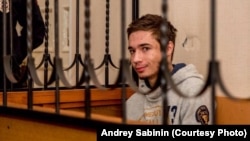Ukrainian man charged with abetting terrorism refuses to testify at Russia trial
| Publisher | Radio Free Europe/Radio Liberty |
| Publication Date | 15 November 2018 |
| Cite as | Radio Free Europe/Radio Liberty, Ukrainian man charged with abetting terrorism refuses to testify at Russia trial, 15 November 2018, available at: https://www.refworld.org/docid/5c34a7599.html [accessed 15 October 2022] |
| Disclaimer | This is not a UNHCR publication. UNHCR is not responsible for, nor does it necessarily endorse, its content. Any views expressed are solely those of the author or publisher and do not necessarily reflect those of UNHCR, the United Nations or its Member States. |
2018-11-15
 Pavlo Hryb in a court in Krasnodar in October 2017
Pavlo Hryb in a court in Krasnodar in October 2017
A 20-year-old Ukrainian man charged with abetting terrorism has refused to testify at his trial in the Russian city of Rostov-on-Don.
"I am not guilty and refuse to give any testimonies," Pavlo Hryb told the North Caucasus Regional Military Court where the trial resumed on November 15.
Hryb, whose family contends he was set up by the Russian Federal Security Service (FSB), went on trial on July 23, but the court halted it after finding that the formal charge against the defendant was based on a clause of the Criminal Code that had not been in place at the time of the alleged crime.
Prosecutors sent the case back to the court in October after correcting what Russian media called a "procedural mistake."
Hryb went missing in August 2017 after he traveled to Belarus to meet a woman he met online.
Relatives believe he walked into a trap set by the FSB, which later told Ukraine that Hryb was being held in a detention center in Russia on suspicion of abetting terrorism.
Russian investigators accuse Hryb of using the Internet to instruct a teenage girl in Russia's southern city of Sochi to carry out a terrorist act using an explosive device.
Hryb's father, Ihor Hryb, has argued that the case against his son was Russian retaliation for Internet posts that were openly critical of Russia's interference in Ukraine.
Russia seized control of Ukraine's Crimean Peninsula in March 2014 after sending in troops and staging a referendum dismissed as illegal by at least 100 countries.
Moscow backs separatists in a war against government forces that has killed more than 10,300 people in eastern Ukraine since April 2014.
Based on reporting by TASS and Interfax
Link to original story on RFE/RL website
